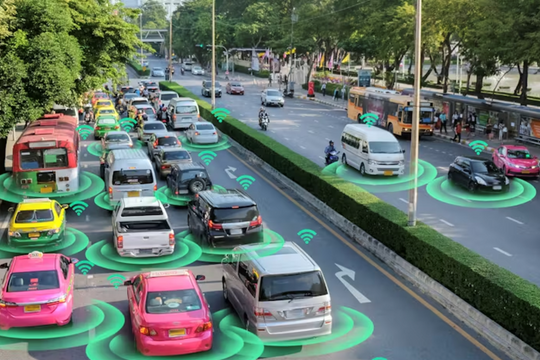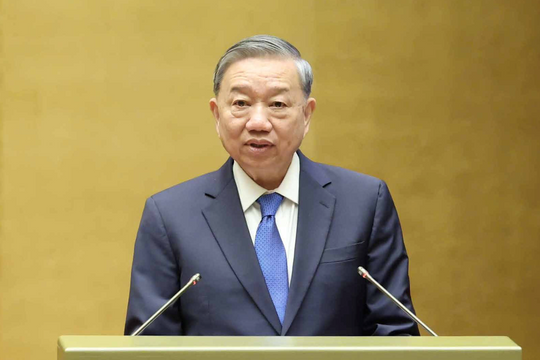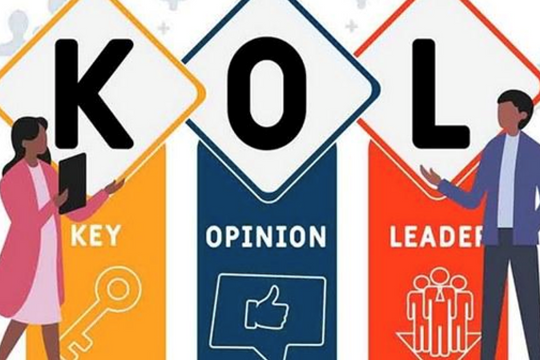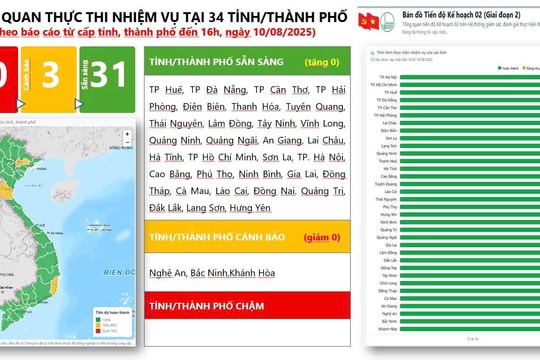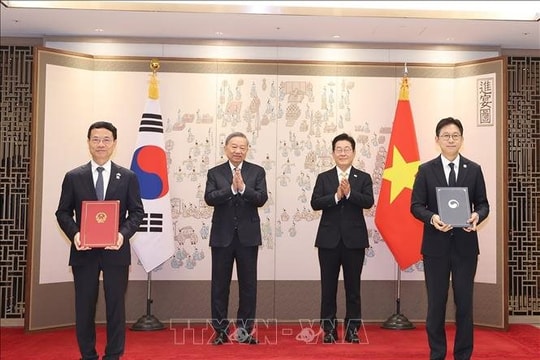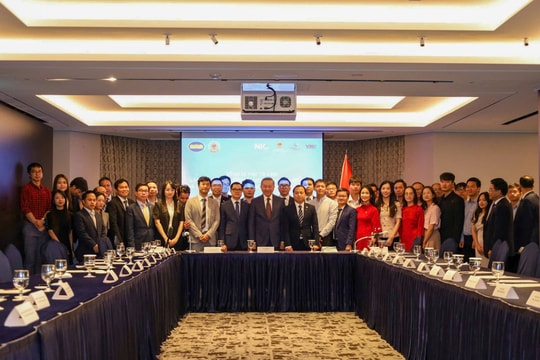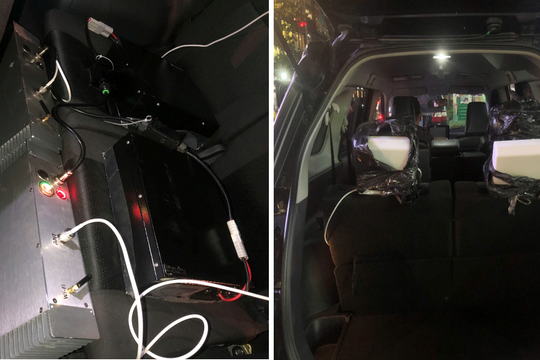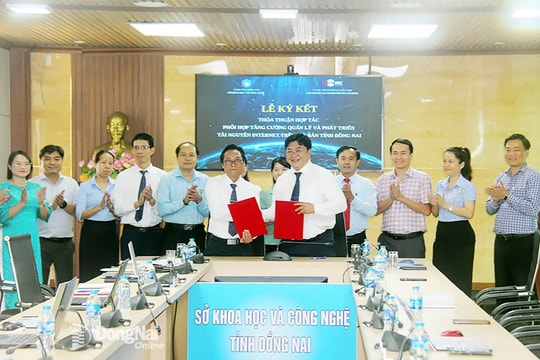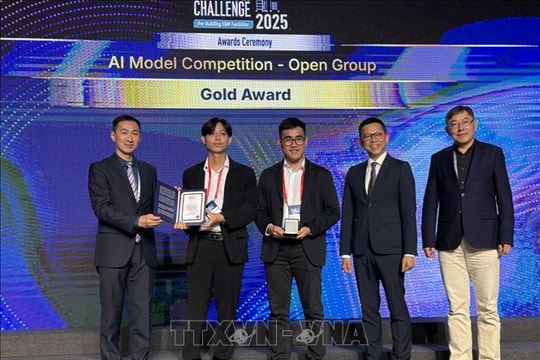THE FIRST TIME "MAKE IN VIETNAM" IDEA WAS LAUNCHED
At the first Vietnam Online Business Forum in May 2019, Prime Minister Nguyen Xuan Phuc gave a message on the development of Vietnamese digital technology enterprises, on the transformation from a Vietnam that focused on outsourcing products to a Vietnam that makes Vietnamese products which were created in Vietnam, manufactured in Vietnam, designed in Vietnam.
"Make in Vietnam" is the slogan created by the Ministry of Information and Communications (MIC) with the aim of promoting the domestic ICT industry. There are many hidden messages in this slogan. While "Made in Vietnam" is a familiar phrase associated with the place of origin, localization rates, tariffs, import and export, the slogan "Make in Vietnam" initiated by the Ministry of Information and Communications has a completely different meaning.
"Make in Vietnam" is a term to convey the strategy, the call and the shift in the development direction of Vietnamese digital technology enterprises.

"Make in Vietnam" does not care where the technology is imported from, whether the production is assembled or manufactured, as long as those values are produced in Vietnam. As for "Make in Vietnam", the Ministry of Information and Communications wants to have a strong shift from assembling and processing to creating and designing, thereby giving birth to Vietnamese digital products.
When implementing the "Make in Vietnam" strategy, businesses will have to be more creative and design more, thus mobilizing Vietnamese intelligence, and solving the problems of Vietnam. The added value in Vietnam is also higher than merely processing and assembling.
Through the "Make in Vietnam" strategy, Vietnam will improve the quality of growth, build an autonomous economy and participate more deeply in the global value chain. This approach will help Vietnam soon realize the goal to become a modern industrialized country.
Delivering an inspirational speech at the 25th anniversary of the establishment of FPT Information System Co., Ltd. (FIS), Minister of Information and Communications Nguyen Manh Hung affirmed that: "Without "Make in Vietnam", Vietnam will hardly be able to become a developed country.
Without "Make in Vietnam", we will not be able to make contributions to the development of humanity".
After that message of the head of the Government and the affirmation of the Minister of Information and Communications, big names of Vietnamese technology industry including Viettel, VNPT, FPT, Vingroup, Misa, BKAV... all delivered their commitments to promote "Make in Vietnam" products in the action plan conference, considered "Make in Vietnam" as their vision, missions, core values.
Within over a year, Vietnamese ICT companies have made impressive achievements that brought positive changes and impact on the overall economic and social development. Many national platforms have been carried out. All coming as an affirmation that Vietnamese technology enterprises have enough intelligence and creativity to master technology and turn Vietnam into a digital society in the near future.
In the context of industrial revolution 4.0 and the COVID-19 influence around the world in 2020, ICT companies have shown their important role in the development of the digital economy in Vietnam. At the same time, the enterprises with Make in Vietnam products will contribute to bring civilized and modern digital platforms to society.
5G EQUIPMENT COMMERCIALIZATION AND VIETNAM PRIDE
On January 17, 2020, the first 5G video call using Viettel gNodeB transceiver was made successfully, marking an important milestone of Vietnam in the process of developing a broadband network. The success of this first 5G call has named Vietnam as one of the few countries in the world that can produce 5G equipment.
To do this, Viettel has invested heavily in high quality IT human resources. Viettel employed more than 1,000 IT engineers and used up to 300 experienced engineers to the 5G production research program. Viettel Group has also approved a budget of VND 500 billion for the development of Microcell 5G and additional VND 200 billion for a 5G lab. Viettel has also cooperated with many partners from the US, South Korea and India on chip sets, hardware and software for 5G.
On July 6, 2020, VinSmart Research and Production Joint Stock Company, the technology arm of the conglomerate Vingroup, also announced its Vsmart Aris 5G smartphone model. VinSmart's 5G smartphone happened only a half year after Viettel made the first 5G call on its own NodeB device. With this announcement, VinSmart has become the first Vietnamese company to successfully produce terminals supporting 5G technology.
Tran Minh Trung, Deputy General Director of VinSmart said: "VinSmart has determined 5G as its strategic project in the hope that Vietnamese consumers will get early access to the most advanced technologies in the world. We will not only research and develop both hardware and software by ourselves, but will create a "make in Vietnam" 5G ecosystem".
In the future, the company plans to release new phones that support both Sub-6 and mmWave frequencies.
As a result, two Vietnamese corporations have successfully announced the production of 5G equipment, from terminals to NodeB station. It doesn't only affirm Vietnamese enterprises' capacities to master the most advanced technologies but also Vietnam's pride to the world.
MASTERING CRITICAL TECHNOLOGIES
Apart from 5G, the year of 2019-2020 also made a big breakthrough in which Vietnamese ICT businesses can master important technology platforms for building and developing e-Government and smart cities.
In March 2019, VNPT Group completed the construction of National E-Document Exchange Platform, creating an integrated platform, connecting information systems, databases of ministries, branches and localities. National E-document Exchange Platform is compared to a transport system, connecting agencies with each other in digital space.
After the success of the national document linkage axis, VNPT Group continues to make its hallmark when building and successfully connecting the National Public Service Portal (NPSP) in December 2019. The National Service Portal plays the role of connecting the Government with people and businesses in the digital space. With the NPSP and the National E-document Exchange Platform (NEEP), the Government is gradually constructing an effective e-Government which already exists in many nations," said Minister, Chairman of the Government Office (GO) Mai Tien Dung.
And it's not stopping there, on August 19, 2020, the Government Office launched the National Reporting Information System (IRIS) and the Government Operations Center. The Government Operations Center is connected with the National Reporting System, national database and those of ministries, government agencies, provinces and cities, which allow the prime minister and other government leaders to interact directly with ministries, provinces and cities.
On the other hand, in order to promote comprehensive digital transformation in all fields, "Make in Vietnam" digital platforms are identified as breakthrough solutions. Therefore, from the middle of April 2020 up to now, the Ministry of Information and Communications has continuously introduced many Make in Vietnam platforms such as: online learning and training platforms (e-learning platforms); remote medical consultation platforms; online health consulting platform VOV Bacsi24; Vietnamese cloud computing platforms; Postal code platforms Vpostcode; Online conferencing platforms Zavi, Comeet; enterprise management platform 1Office.
Recently, at the International Conference-Exhibition Vietnam Information Security Day 2020 taking place on November 2nd in Hanoi, Minister of Information and Communications Nguyen Manh Hung affirmed that Vietnam has mastered 90 percent of the ecosystem of cyber security products serving Party and State agencies.
"It is expected that in early 2021, Vietnam is likely to be one among few countries mastering 100 percent of the ecosystem", said MIC Minister. "Digital transformation is a comprehensive process of the whole country. Since digital applications are to be popularized to every citizen, ensuring cyber safety is a must. To do this, IT businesses should make related software both cheap and user-friendly to the community".
ThecontinuousdeploymentoflargenationalsystemsandplatformshasaffirmedtheabilityofVietnameseenterprisestomasteradvancedtechnologies.ThatisanimportantpremiseforVietnamtobeapioneerinbuildingadigitalgovernment, a digital society in the region and the world in the coming years.


